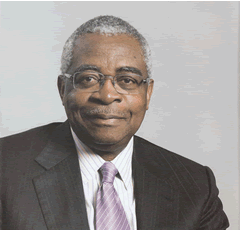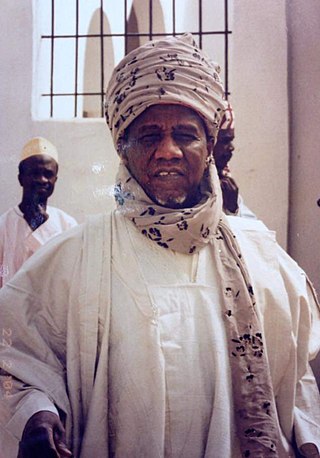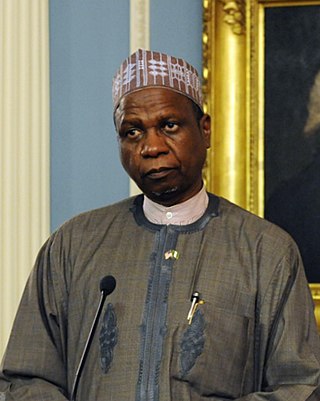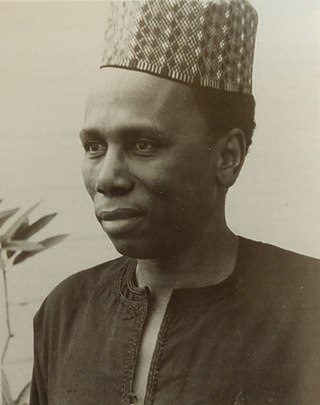Related Research Articles
Nigeria’s transport network has expanded in recent years to accommodate a growing population. The transport and storage sector was valued at N2.6trn ($6.9bn) in current basic prices in 2020, down from N3trn ($8bn) in 2019, according to the National Bureau of Statistics (NBS). This was reflected in a lower contribution to GDP, at 1.8% in the fourth quarter of 2020, down from 2.1% during the same period the previous year but higher than the 0.8% recorded in the third quarter of 2020. One of the most significant challenges facing the sector is meeting the needs of both large coastal cities and rural inland communities in order to fully unlock the country’s economic potential. This is especially the case with mining and agriculture, both of which are expected to benefit from two large-scale projects: the Lekki Port in Lagos and the Kano-Maradi rail line in the north of the country.

Shehu Usman Aliyu Shagari was a Nigerian politician who was the first democratically elected president of Nigeria, after the transfer of power by military head of state General Olusegun Obasanjo in 1979, which gave rise to the Second Nigerian Republic.
Chanchangi Airlines Nigeria Limited was a privately owned and operated airline with its head office in the Chanchangi Office Complex in Kaduna, Nigeria. It operates scheduled domestic passenger services. Its main base was Murtala Mohammed International Airport, Lagos, with hubs at Kaduna, Abuja, and Port Harcourt. Alhaji Ahmadu Chanchangi, its founder, hails from Chanchangi village in Takum Local Government of Taraba state, Nigeria.

Theophilus Yakubu Danjuma is a Nigerian politician and retired lieutenant general who played a key role in post-independence military and political events in Nigeria. Danjuma amassed an enormous fortune through shipping and petroleum.
The Federal Ministry of Aviation is one of the Federal Ministries of Nigeria that regulates air travel and aviation services in Nigeria. The current Minister of Aviation is Festus Keyamo. He was appointed on 21 August 2023 by President Bola Tinubu.
Julius Berger is a Nigerian construction company, headquartered in Abuja, with additional permanent locations in Lagos and Uyo.

Aminu Saleh was a Nigerian administrator, former Secretary to the Government of the Federation, former Finance Minister of Nigeria, and permanent secretary in the Nigerian ministry of Defense. He became the chairman of the National Qu'ranic Recitation Committee in 2006.

Mahmud Yayale Ahmed, CFR is a Nigerian civil servant and politician who served as Defence Minister of Nigeria.

Adefemi Kila is a Nigerian politician and engineer who served in the Senate, representing Ekiti Central in April 2007 just after working for Julius Berger Nigerian Plc for 30 years as a civil engineer and as a technical manager (administration) for 18 years. He is currently a council member of Standards Organisation of Nigeria SON. He is a devoted Christian of the Anglican church of Nigeria.
Obafemi Anibaba is a Nigerian civil servant and businessman who was appointed Federal Minister of Works in March 2006 and was redeployed as Minister of Communications in September 2006 during the presidency of Olusegun Obasanjo.
Chagoury Group is a Nigerian multinational business conglomerate headquartered in Lagos, Lagos State. Founded in 1971 by Gilbert R. Chagoury and Ronald Chagoury, their businesses include construction and property development, flour mills, water bottling and purification, glass manufacturing, insurance, hotels, furniture manufacturing, telecommunications, transportation, IT, catering and international financing.
Hassan Adebayo Sunmonu is a Nigerian trade unionist who was president of the Nigerian Labour Congress from 1978 to 1984. He is a former General-Secretary of the Organisation of African Trade Union Unity.
Aliyu Mohammed was a Nigerian administrator who was Secretary to the Government of the Federation from 1990 to 1993. He held the title of Waziri Jema'a.
Ibrahim Damcida (1933–2012) was a Nigerian administrator who rose through the administrative cadre of the Northern regional government and then the federal civil service to retire as Permanent Secretary, Ministry of Finance. During the administration of the youthful Yakubu Gowon, he was considered to among a group known as super Permanent Secretaries.
Salihu Mustafa, FNSE, FAENG, FNAHS, FAS, is a Nigerian academic, professor of civil engineering and former Vice-Chancellor of Federal University of Technology Yola (FUTY), Yola, Adamawa State, Nigeria. He has taught in many universities in Nigeria and is currently a visiting professor to Kebbi State University of Science and Technology, Aliero and Usmanu Danfodiyo University, Sokoto. He is married to Hajiya Fatima and they have four children.

Ahmed Joda OFR, CON, CFR was a Nigerian administrator who rose through the administrative cadre of the Northern regional government and then the federal civil service to retire as Permanent Secretary, Ministry of Industries. During the administration of the youthful Yakubu Gowon, he was considered to be among a group known as super Permanent Secretaries.

Abdu Gusau, Garkuwan Sokoto, MBE, OON (1918–1994), was a Nigerian civil engineer, and statesman who served as the Garkuwa of Sokoto until his death in 1994. He was the Chief estate engineer for Ahmadu Bello University, Zaria from 1967 to 1972 where he was in charge of estates, which included buildings, the campus road network and the water supply. Gusau also served as a principal engineer with Taylor Woodrow of London where he worked on building London Heathrow's airport terminal.
Muhammad Kabir Nuhu-Koko, also known as Kabiru Nuhu-Koko, or M.K. Nuhu-Koko is a Nigerian Civil Engineer, and career Civil Servant who served in the Federal Ministry of works, Lagos from 1984 to 1989. He later joined the Central Bank of Nigeria in 1990 and rose to the position of Deputy Director in the Procurement and Support Services Department until his retirement in 2019. Nuhu-koko was also the president general of the Unity Schools Old Students Association USOSA from 2013 until 2015.

Habu Gumel was born on 1 April 1949, in Gumel, Jigawa State, in Nigeria. He is currently the Nigeria Olympic Committee (NOC) President and an honorary member of the International Olympic Committee. Although the COVID-19 pandemic led to the delay of the Tokyo Games, Gumel stated that he believes that postponement will help the nation's athletes with their preparation.
References
- ↑ Musa, Ibraheem (27 January 2009). "Nigeria: 'M .T Usman's Life Worthy of Emulation'". Daily Trust (Abuja).
- 1 2 3 "We've Done Better with Oil Money". New Nigeria. July 4, 1982.